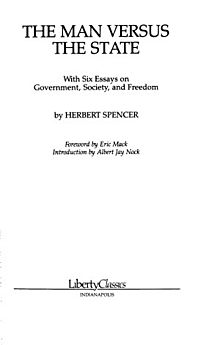The Man Versus the State facts for kids

The Man Versus the State by Herbert Spencer
|
|
| Author | Herbert Spencer |
|---|---|
| Language | English |
| Genre | Political Theory and Philosophy |
| Publisher | Williams and Norgate, London and Edinburgh |
|
Publication date
|
1884 |
The Man Versus the State is an important book about how governments should work. It was written by Herbert Spencer, an English thinker.
The book was first published in 1884. It was made from articles Spencer had written earlier. It has four main parts: "The New Toryism," "The Coming Slavery," "The Sins of Legislators," and "The Great Political Superstition."
In this book, Spencer worried that the idea of "liberalism" was changing. Liberalism usually means supporting freedom and limiting government power. But Spencer saw that some people who called themselves liberals were starting to want the government to have more control. He warned that this could lead to a new kind of "slavery," where people lose their freedom.
Spencer believed that liberalism had helped people become free from old systems like slavery and feudalism. But he thought this new trend of giving the government more power could create a worse situation. The writer Henry Hazlitt said this book was "One of the most powerful and influential arguments for limited government, laissez faire and individualism ever written." This means it strongly argued for governments to have less power, for people to be free to make their own choices, and for the economy to be mostly free from government rules.
"The function of Liberalism in the past was that of putting a limit to the powers of kings. The function of true Liberalism in the future will be that of putting a limit to the power of Parliaments."
—Herbert Spencer, The Man Versus the State
Contents
Understanding New Ideas About Government
In the first part of his book, Herbert Spencer talks about how some people who called themselves "Liberals" were acting more like "Tories." In Spencer's time, Tories usually supported strong government and traditional power. Liberals, on the other hand, usually fought for more freedom and less government control.
How Liberals Changed Their Views
Spencer noticed a big change. He said that these new "Liberals" were no longer trying to limit the power of the government. Instead, they seemed interested in making the government and Parliament more powerful. This was the opposite of what earlier Liberals believed.
Spencer wondered why this change was happening. He asked how Liberals had forgotten their original goal of protecting people's rights. He saw them supporting laws that told citizens what to do, which meant people had less freedom.
"And now comes the inquiry—How is it that Liberals have lost sight of this? How is it that Liberalism, getting more and more into power, has grown more and more coercive in its legislation? How is it that, either directly through its own majorities or indirectly through aid given in such cases to the majorities of its opponents, Liberalism has to an increasing extent adopted the policy of dictating the actions of citizens, and, by consequence, diminishing the range throughout which their actions remain free? How are we to explain this spreading confusion of thought which has led it, in pursuit of what appears to be public good, to invert the method by which in earlier days it achieved public good?"
—Herbert Spencer, The Man Versus the State; The New Toryism
Spencer believed that these new "Liberals" were simply replacing the power of kings with the power of Parliament. He thought this was still a problem because it meant the government, no matter who was in charge, had too much control over people's lives.
The Danger of Losing Freedom
In the second part of his book, Spencer talks about a serious concern: the idea of "the coming slavery." He wasn't talking about old forms of slavery. Instead, he meant that if the government gained too much control over people's lives, it could lead to a loss of personal freedom.
Why Too Much Control is a Problem
Spencer believed that some people, including those who called themselves "Liberals" and others who were socialists, thought they could fix society's problems by creating many new rules and government programs. He disagreed with this idea.
He argued that simply making more rules or setting up new government systems wouldn't solve everything. He felt that if people themselves weren't responsible or didn't have good intentions, then no amount of government control could make society perfect.
"The belief, not only of the socialists but also of those so-called Liberals who are diligently preparing the way for them, is that by due skill an ill-working humanity may be framed into well-working institutions. It is a delusion. The defective natures of citizens will show themselves in the bad acting of whatever social structure they are arranged into. There is no political alchemy by which you can get golden conduct out of leaden instincts."
—Herbert Spencer, The Man Versus the State; The Coming Slavery
Spencer's main point was that trying to control every part of people's lives through government might seem like a good idea to solve problems, but it could actually take away their freedom and make things worse in the long run. He believed that true progress came from individuals being free to make their own choices and learn from them, rather than being told what to do by the government.
 | John T. Biggers |
 | Thomas Blackshear |
 | Mark Bradford |
 | Beverly Buchanan |

